Worldview Analysis: Exploring Christian Beliefs and Scientism
VerifiedAdded on 2022/09/12
|7
|1751
|12
Essay
AI Summary
This essay provides a comprehensive worldview analysis, beginning with an examination of Christian beliefs and their implications, particularly in healthcare. It then contrasts these beliefs with the tenets of scientism, exploring arguments against the latter. The analysis further delves into personal worldviews, discussing the nature of ultimate reality, cosmology, the definition of a human being, the concept of knowledge, and the importance of ethics. The essay emphasizes the subjective nature of knowledge and the significance of ethical considerations in decision-making. Finally, it presents a personal perspective on the meaning of existence, highlighting the importance of moral obligations and responsibilities.
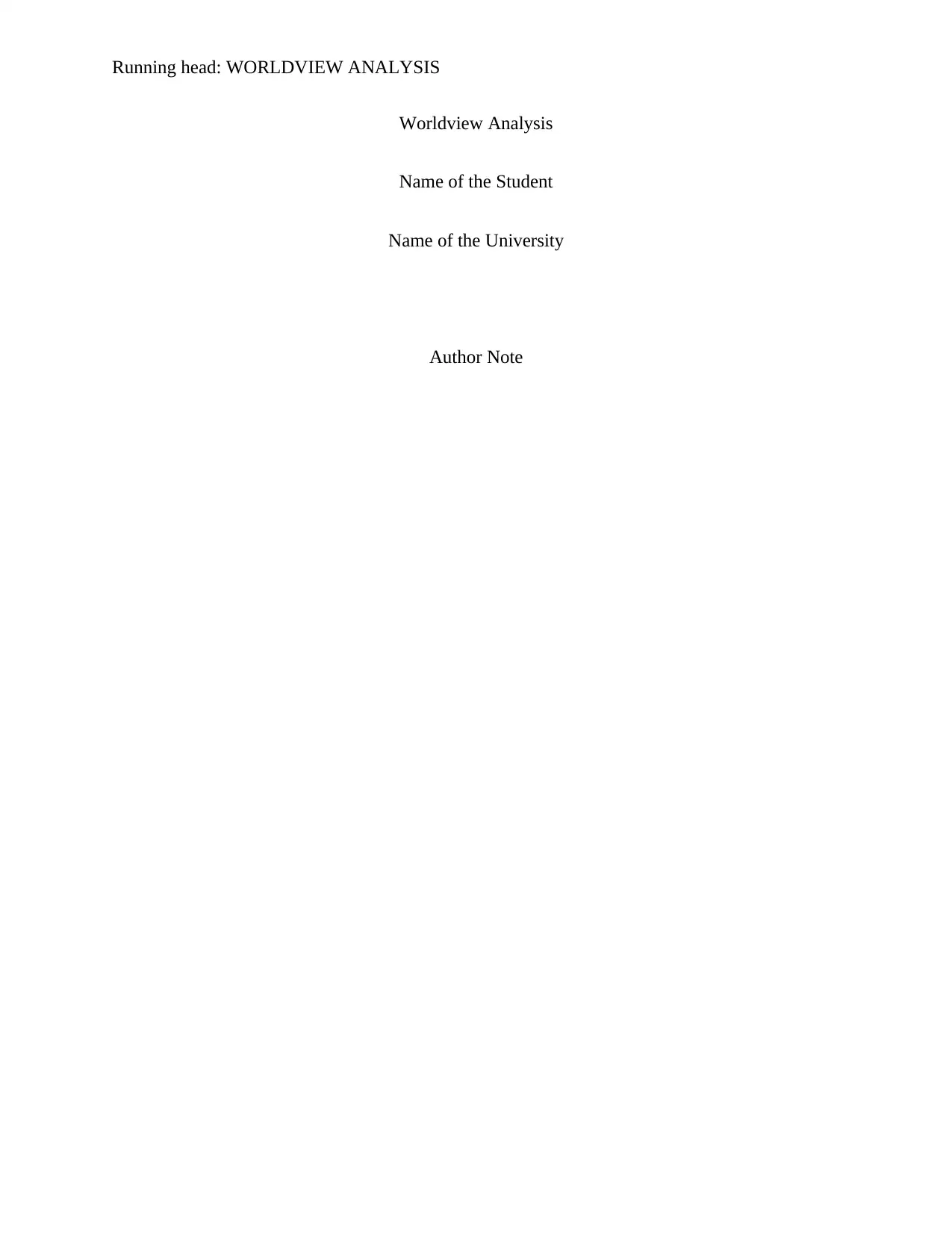
Running head: WORLDVIEW ANALYSIS
Worldview Analysis
Name of the Student
Name of the University
Author Note
Worldview Analysis
Name of the Student
Name of the University
Author Note
Paraphrase This Document
Need a fresh take? Get an instant paraphrase of this document with our AI Paraphraser
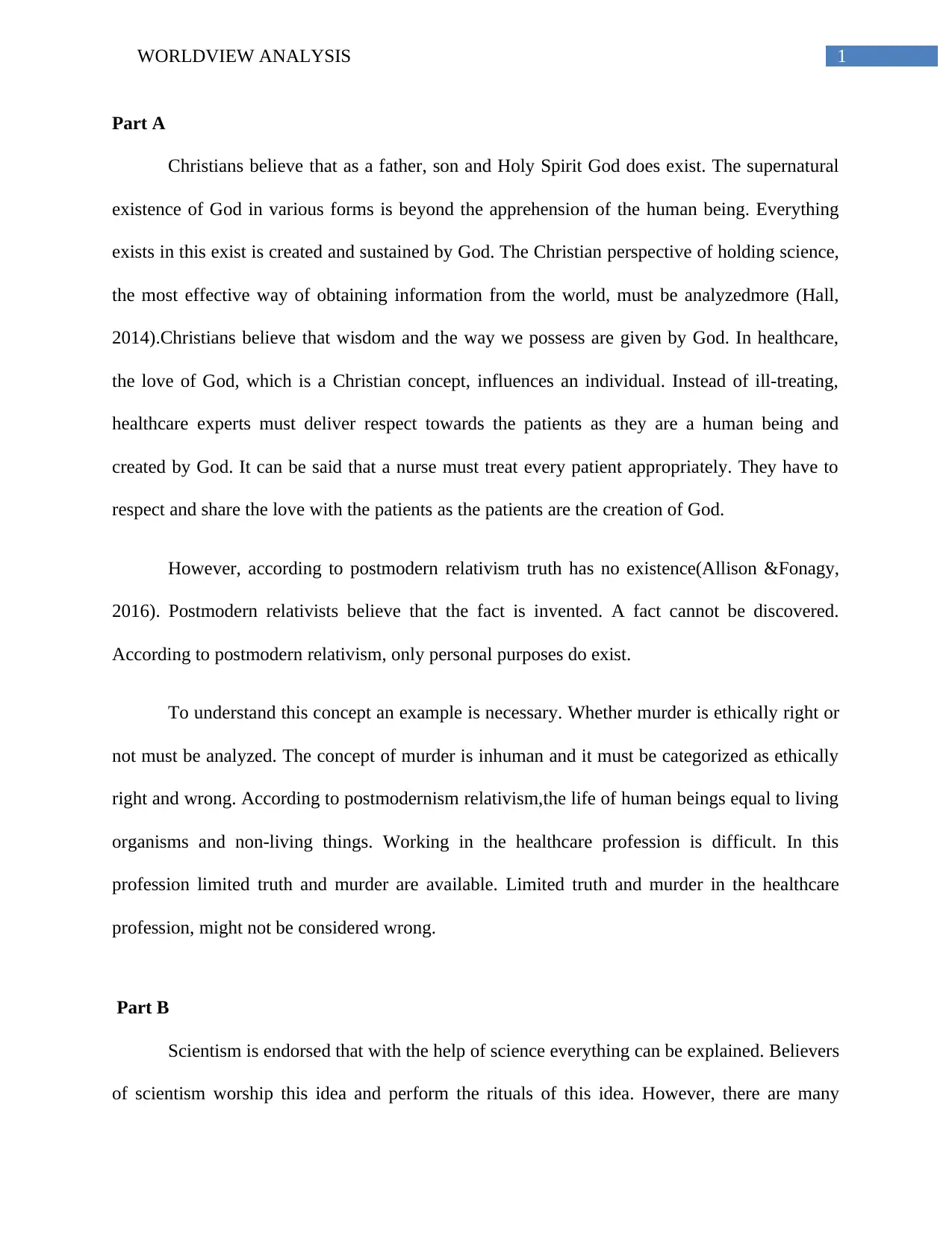
1WORLDVIEW ANALYSIS
Part A
Christians believe that as a father, son and Holy Spirit God does exist. The supernatural
existence of God in various forms is beyond the apprehension of the human being. Everything
exists in this exist is created and sustained by God. The Christian perspective of holding science,
the most effective way of obtaining information from the world, must be analyzedmore (Hall,
2014).Christians believe that wisdom and the way we possess are given by God. In healthcare,
the love of God, which is a Christian concept, influences an individual. Instead of ill-treating,
healthcare experts must deliver respect towards the patients as they are a human being and
created by God. It can be said that a nurse must treat every patient appropriately. They have to
respect and share the love with the patients as the patients are the creation of God.
However, according to postmodern relativism truth has no existence(Allison &Fonagy,
2016). Postmodern relativists believe that the fact is invented. A fact cannot be discovered.
According to postmodern relativism, only personal purposes do exist.
To understand this concept an example is necessary. Whether murder is ethically right or
not must be analyzed. The concept of murder is inhuman and it must be categorized as ethically
right and wrong. According to postmodernism relativism,the life of human beings equal to living
organisms and non-living things. Working in the healthcare profession is difficult. In this
profession limited truth and murder are available. Limited truth and murder in the healthcare
profession, might not be considered wrong.
Part B
Scientism is endorsed that with the help of science everything can be explained. Believers
of scientism worship this idea and perform the rituals of this idea. However, there are many
Part A
Christians believe that as a father, son and Holy Spirit God does exist. The supernatural
existence of God in various forms is beyond the apprehension of the human being. Everything
exists in this exist is created and sustained by God. The Christian perspective of holding science,
the most effective way of obtaining information from the world, must be analyzedmore (Hall,
2014).Christians believe that wisdom and the way we possess are given by God. In healthcare,
the love of God, which is a Christian concept, influences an individual. Instead of ill-treating,
healthcare experts must deliver respect towards the patients as they are a human being and
created by God. It can be said that a nurse must treat every patient appropriately. They have to
respect and share the love with the patients as the patients are the creation of God.
However, according to postmodern relativism truth has no existence(Allison &Fonagy,
2016). Postmodern relativists believe that the fact is invented. A fact cannot be discovered.
According to postmodern relativism, only personal purposes do exist.
To understand this concept an example is necessary. Whether murder is ethically right or
not must be analyzed. The concept of murder is inhuman and it must be categorized as ethically
right and wrong. According to postmodernism relativism,the life of human beings equal to living
organisms and non-living things. Working in the healthcare profession is difficult. In this
profession limited truth and murder are available. Limited truth and murder in the healthcare
profession, might not be considered wrong.
Part B
Scientism is endorsed that with the help of science everything can be explained. Believers
of scientism worship this idea and perform the rituals of this idea. However, there are many
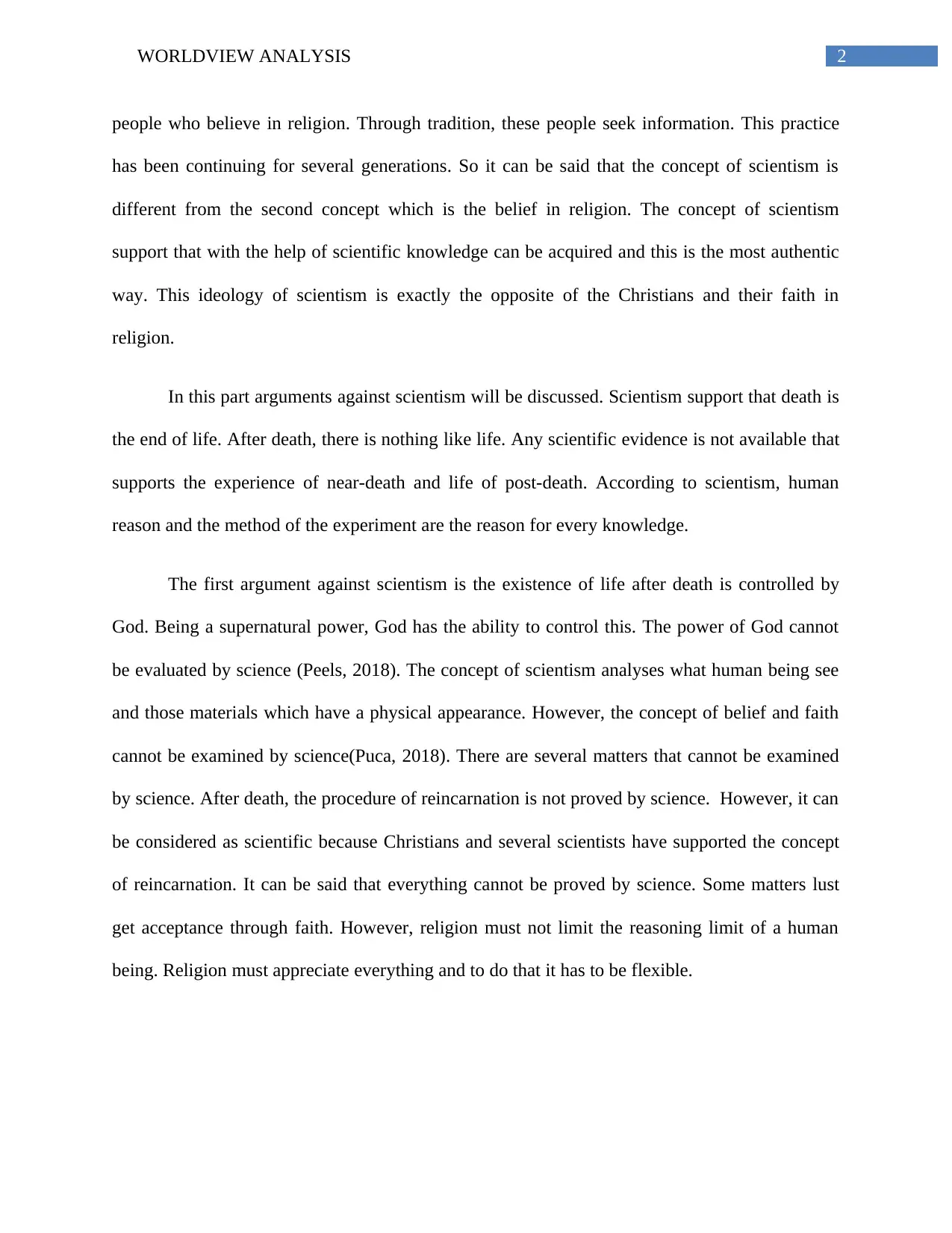
2WORLDVIEW ANALYSIS
people who believe in religion. Through tradition, these people seek information. This practice
has been continuing for several generations. So it can be said that the concept of scientism is
different from the second concept which is the belief in religion. The concept of scientism
support that with the help of scientific knowledge can be acquired and this is the most authentic
way. This ideology of scientism is exactly the opposite of the Christians and their faith in
religion.
In this part arguments against scientism will be discussed. Scientism support that death is
the end of life. After death, there is nothing like life. Any scientific evidence is not available that
supports the experience of near-death and life of post-death. According to scientism, human
reason and the method of the experiment are the reason for every knowledge.
The first argument against scientism is the existence of life after death is controlled by
God. Being a supernatural power, God has the ability to control this. The power of God cannot
be evaluated by science (Peels, 2018). The concept of scientism analyses what human being see
and those materials which have a physical appearance. However, the concept of belief and faith
cannot be examined by science(Puca, 2018). There are several matters that cannot be examined
by science. After death, the procedure of reincarnation is not proved by science. However, it can
be considered as scientific because Christians and several scientists have supported the concept
of reincarnation. It can be said that everything cannot be proved by science. Some matters lust
get acceptance through faith. However, religion must not limit the reasoning limit of a human
being. Religion must appreciate everything and to do that it has to be flexible.
people who believe in religion. Through tradition, these people seek information. This practice
has been continuing for several generations. So it can be said that the concept of scientism is
different from the second concept which is the belief in religion. The concept of scientism
support that with the help of scientific knowledge can be acquired and this is the most authentic
way. This ideology of scientism is exactly the opposite of the Christians and their faith in
religion.
In this part arguments against scientism will be discussed. Scientism support that death is
the end of life. After death, there is nothing like life. Any scientific evidence is not available that
supports the experience of near-death and life of post-death. According to scientism, human
reason and the method of the experiment are the reason for every knowledge.
The first argument against scientism is the existence of life after death is controlled by
God. Being a supernatural power, God has the ability to control this. The power of God cannot
be evaluated by science (Peels, 2018). The concept of scientism analyses what human being see
and those materials which have a physical appearance. However, the concept of belief and faith
cannot be examined by science(Puca, 2018). There are several matters that cannot be examined
by science. After death, the procedure of reincarnation is not proved by science. However, it can
be considered as scientific because Christians and several scientists have supported the concept
of reincarnation. It can be said that everything cannot be proved by science. Some matters lust
get acceptance through faith. However, religion must not limit the reasoning limit of a human
being. Religion must appreciate everything and to do that it has to be flexible.
⊘ This is a preview!⊘
Do you want full access?
Subscribe today to unlock all pages.

Trusted by 1+ million students worldwide
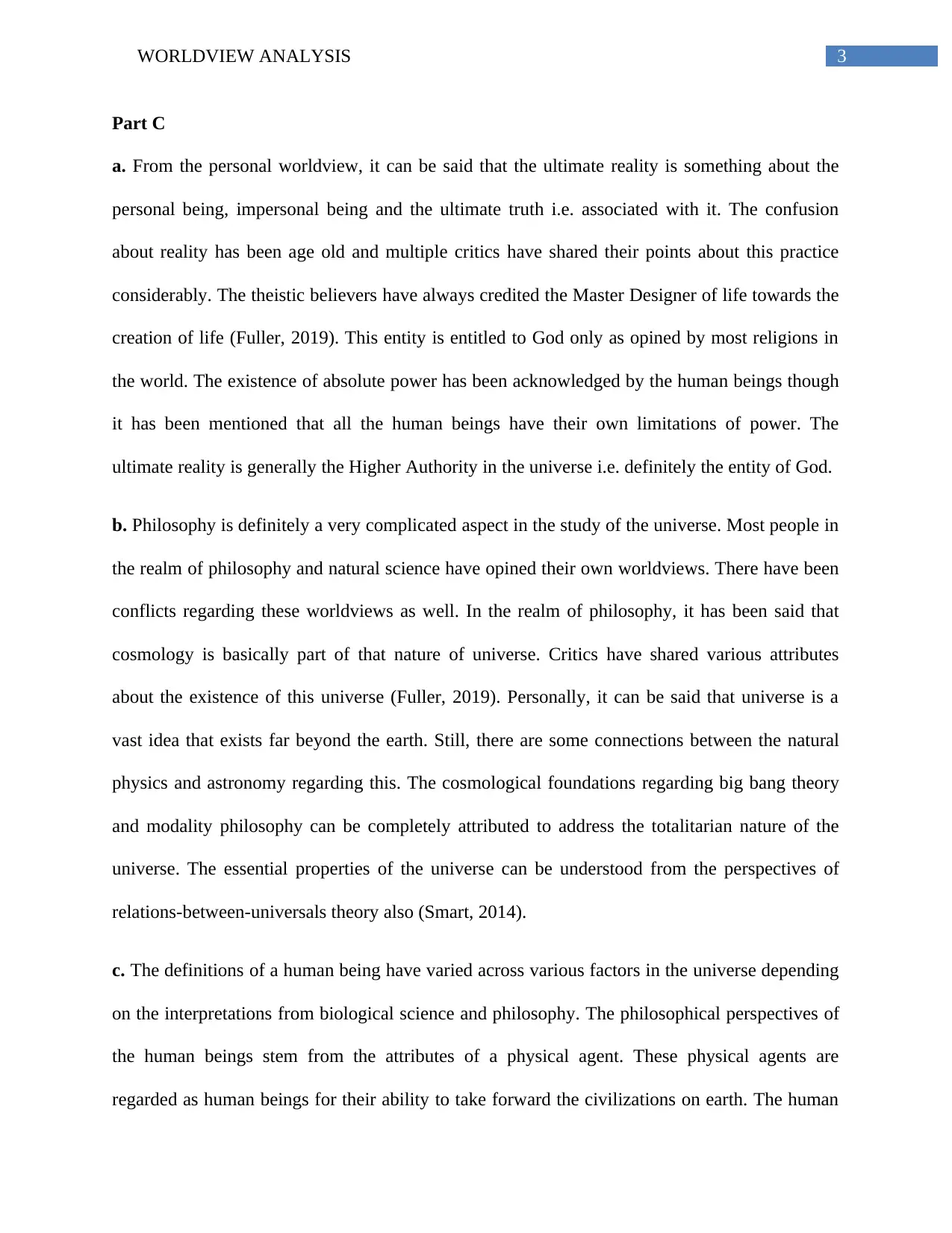
3WORLDVIEW ANALYSIS
Part C
a. From the personal worldview, it can be said that the ultimate reality is something about the
personal being, impersonal being and the ultimate truth i.e. associated with it. The confusion
about reality has been age old and multiple critics have shared their points about this practice
considerably. The theistic believers have always credited the Master Designer of life towards the
creation of life (Fuller, 2019). This entity is entitled to God only as opined by most religions in
the world. The existence of absolute power has been acknowledged by the human beings though
it has been mentioned that all the human beings have their own limitations of power. The
ultimate reality is generally the Higher Authority in the universe i.e. definitely the entity of God.
b. Philosophy is definitely a very complicated aspect in the study of the universe. Most people in
the realm of philosophy and natural science have opined their own worldviews. There have been
conflicts regarding these worldviews as well. In the realm of philosophy, it has been said that
cosmology is basically part of that nature of universe. Critics have shared various attributes
about the existence of this universe (Fuller, 2019). Personally, it can be said that universe is a
vast idea that exists far beyond the earth. Still, there are some connections between the natural
physics and astronomy regarding this. The cosmological foundations regarding big bang theory
and modality philosophy can be completely attributed to address the totalitarian nature of the
universe. The essential properties of the universe can be understood from the perspectives of
relations-between-universals theory also (Smart, 2014).
c. The definitions of a human being have varied across various factors in the universe depending
on the interpretations from biological science and philosophy. The philosophical perspectives of
the human beings stem from the attributes of a physical agent. These physical agents are
regarded as human beings for their ability to take forward the civilizations on earth. The human
Part C
a. From the personal worldview, it can be said that the ultimate reality is something about the
personal being, impersonal being and the ultimate truth i.e. associated with it. The confusion
about reality has been age old and multiple critics have shared their points about this practice
considerably. The theistic believers have always credited the Master Designer of life towards the
creation of life (Fuller, 2019). This entity is entitled to God only as opined by most religions in
the world. The existence of absolute power has been acknowledged by the human beings though
it has been mentioned that all the human beings have their own limitations of power. The
ultimate reality is generally the Higher Authority in the universe i.e. definitely the entity of God.
b. Philosophy is definitely a very complicated aspect in the study of the universe. Most people in
the realm of philosophy and natural science have opined their own worldviews. There have been
conflicts regarding these worldviews as well. In the realm of philosophy, it has been said that
cosmology is basically part of that nature of universe. Critics have shared various attributes
about the existence of this universe (Fuller, 2019). Personally, it can be said that universe is a
vast idea that exists far beyond the earth. Still, there are some connections between the natural
physics and astronomy regarding this. The cosmological foundations regarding big bang theory
and modality philosophy can be completely attributed to address the totalitarian nature of the
universe. The essential properties of the universe can be understood from the perspectives of
relations-between-universals theory also (Smart, 2014).
c. The definitions of a human being have varied across various factors in the universe depending
on the interpretations from biological science and philosophy. The philosophical perspectives of
the human beings stem from the attributes of a physical agent. These physical agents are
regarded as human beings for their ability to take forward the civilizations on earth. The human
Paraphrase This Document
Need a fresh take? Get an instant paraphrase of this document with our AI Paraphraser
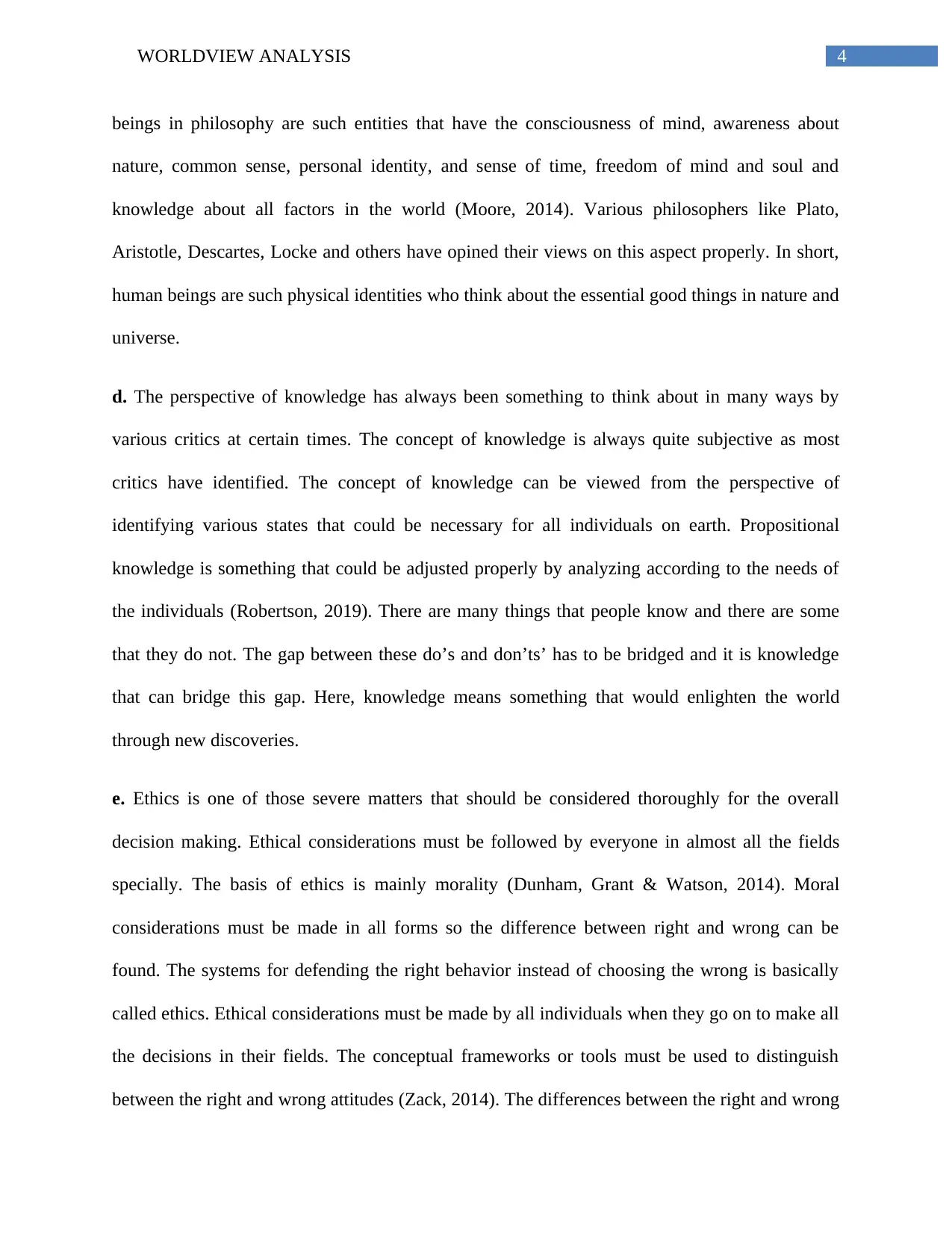
4WORLDVIEW ANALYSIS
beings in philosophy are such entities that have the consciousness of mind, awareness about
nature, common sense, personal identity, and sense of time, freedom of mind and soul and
knowledge about all factors in the world (Moore, 2014). Various philosophers like Plato,
Aristotle, Descartes, Locke and others have opined their views on this aspect properly. In short,
human beings are such physical identities who think about the essential good things in nature and
universe.
d. The perspective of knowledge has always been something to think about in many ways by
various critics at certain times. The concept of knowledge is always quite subjective as most
critics have identified. The concept of knowledge can be viewed from the perspective of
identifying various states that could be necessary for all individuals on earth. Propositional
knowledge is something that could be adjusted properly by analyzing according to the needs of
the individuals (Robertson, 2019). There are many things that people know and there are some
that they do not. The gap between these do’s and don’ts’ has to be bridged and it is knowledge
that can bridge this gap. Here, knowledge means something that would enlighten the world
through new discoveries.
e. Ethics is one of those severe matters that should be considered thoroughly for the overall
decision making. Ethical considerations must be followed by everyone in almost all the fields
specially. The basis of ethics is mainly morality (Dunham, Grant & Watson, 2014). Moral
considerations must be made in all forms so the difference between right and wrong can be
found. The systems for defending the right behavior instead of choosing the wrong is basically
called ethics. Ethical considerations must be made by all individuals when they go on to make all
the decisions in their fields. The conceptual frameworks or tools must be used to distinguish
between the right and wrong attitudes (Zack, 2014). The differences between the right and wrong
beings in philosophy are such entities that have the consciousness of mind, awareness about
nature, common sense, personal identity, and sense of time, freedom of mind and soul and
knowledge about all factors in the world (Moore, 2014). Various philosophers like Plato,
Aristotle, Descartes, Locke and others have opined their views on this aspect properly. In short,
human beings are such physical identities who think about the essential good things in nature and
universe.
d. The perspective of knowledge has always been something to think about in many ways by
various critics at certain times. The concept of knowledge is always quite subjective as most
critics have identified. The concept of knowledge can be viewed from the perspective of
identifying various states that could be necessary for all individuals on earth. Propositional
knowledge is something that could be adjusted properly by analyzing according to the needs of
the individuals (Robertson, 2019). There are many things that people know and there are some
that they do not. The gap between these do’s and don’ts’ has to be bridged and it is knowledge
that can bridge this gap. Here, knowledge means something that would enlighten the world
through new discoveries.
e. Ethics is one of those severe matters that should be considered thoroughly for the overall
decision making. Ethical considerations must be followed by everyone in almost all the fields
specially. The basis of ethics is mainly morality (Dunham, Grant & Watson, 2014). Moral
considerations must be made in all forms so the difference between right and wrong can be
found. The systems for defending the right behavior instead of choosing the wrong is basically
called ethics. Ethical considerations must be made by all individuals when they go on to make all
the decisions in their fields. The conceptual frameworks or tools must be used to distinguish
between the right and wrong attitudes (Zack, 2014). The differences between the right and wrong
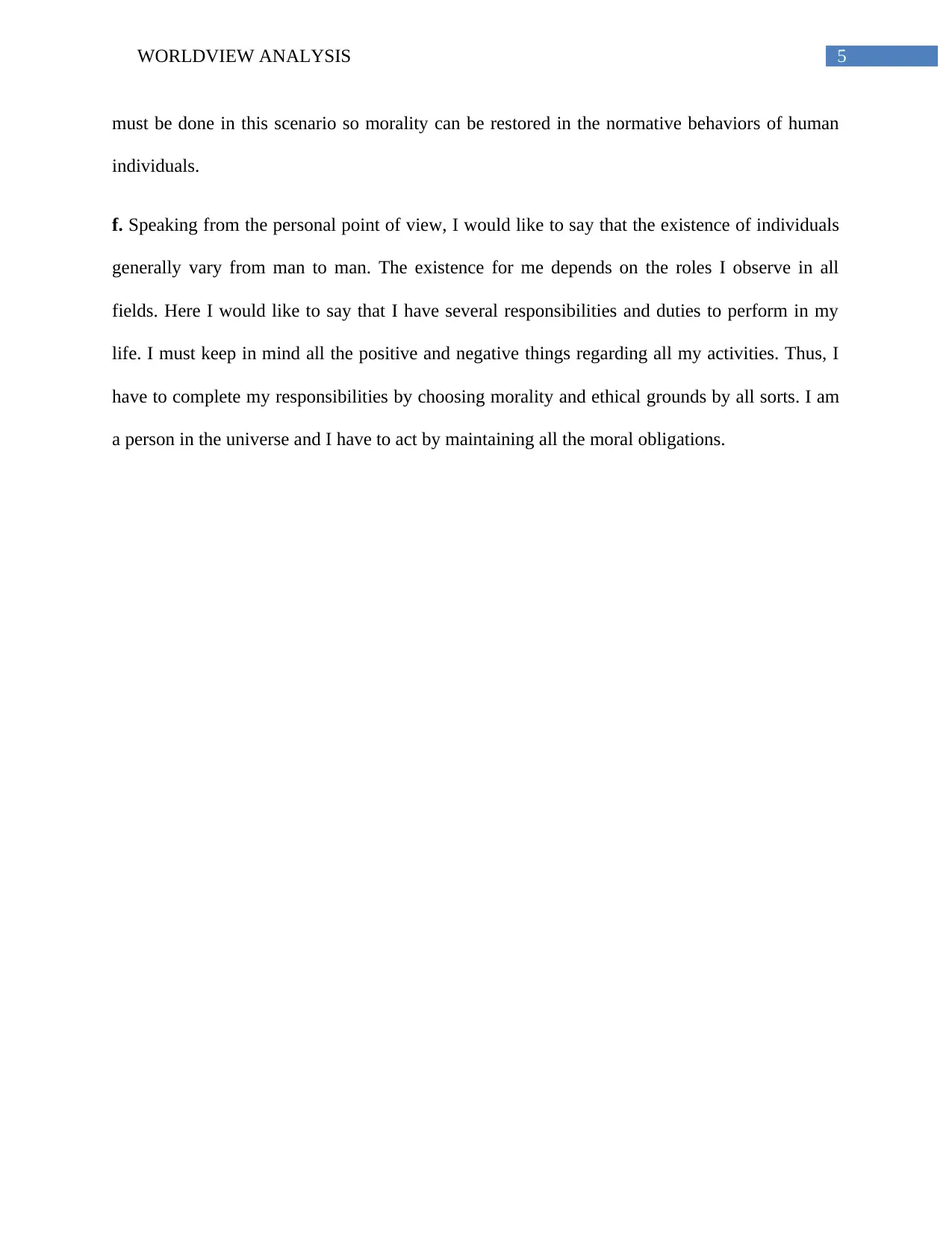
5WORLDVIEW ANALYSIS
must be done in this scenario so morality can be restored in the normative behaviors of human
individuals.
f. Speaking from the personal point of view, I would like to say that the existence of individuals
generally vary from man to man. The existence for me depends on the roles I observe in all
fields. Here I would like to say that I have several responsibilities and duties to perform in my
life. I must keep in mind all the positive and negative things regarding all my activities. Thus, I
have to complete my responsibilities by choosing morality and ethical grounds by all sorts. I am
a person in the universe and I have to act by maintaining all the moral obligations.
must be done in this scenario so morality can be restored in the normative behaviors of human
individuals.
f. Speaking from the personal point of view, I would like to say that the existence of individuals
generally vary from man to man. The existence for me depends on the roles I observe in all
fields. Here I would like to say that I have several responsibilities and duties to perform in my
life. I must keep in mind all the positive and negative things regarding all my activities. Thus, I
have to complete my responsibilities by choosing morality and ethical grounds by all sorts. I am
a person in the universe and I have to act by maintaining all the moral obligations.
⊘ This is a preview!⊘
Do you want full access?
Subscribe today to unlock all pages.

Trusted by 1+ million students worldwide
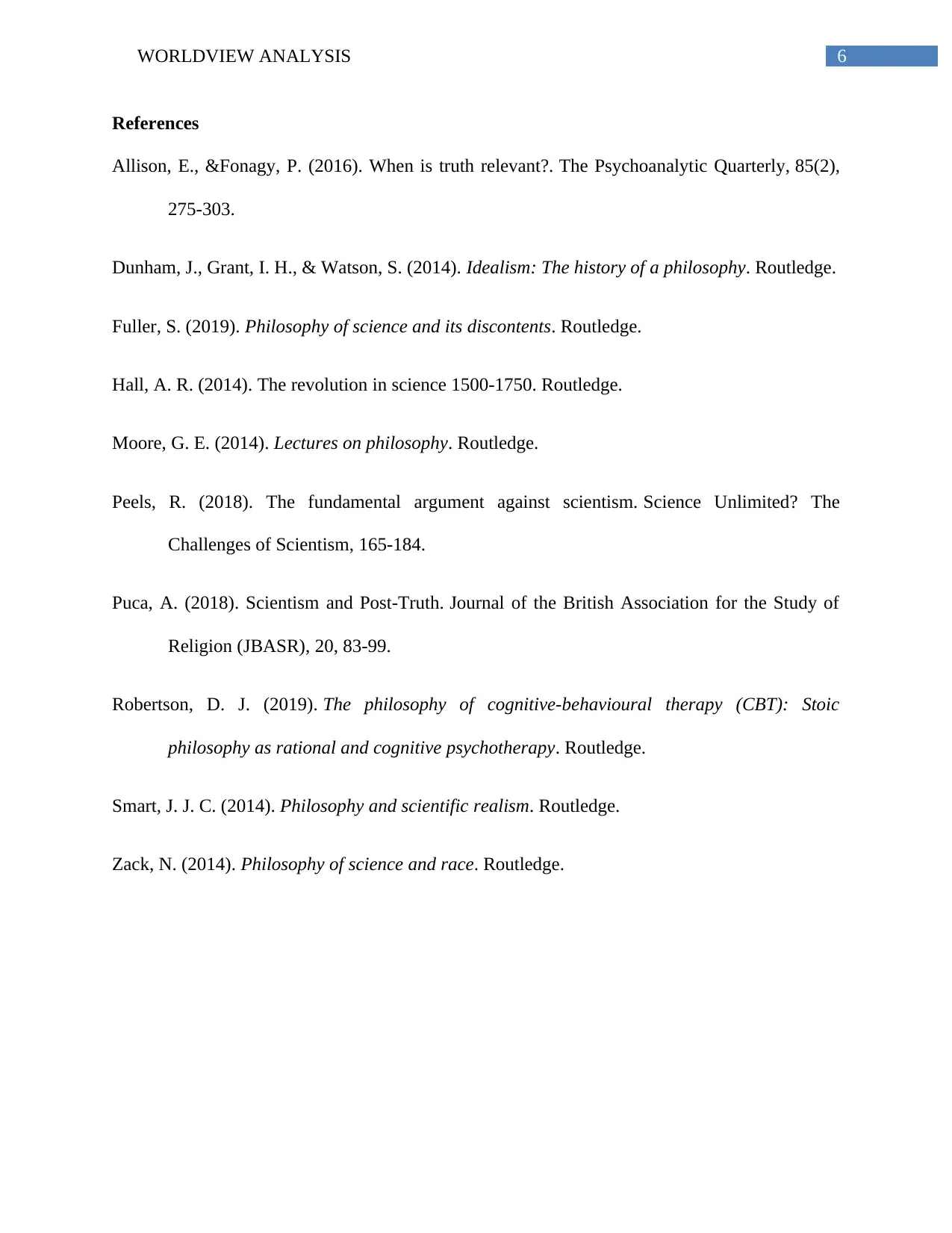
6WORLDVIEW ANALYSIS
References
Allison, E., &Fonagy, P. (2016). When is truth relevant?. The Psychoanalytic Quarterly, 85(2),
275-303.
Dunham, J., Grant, I. H., & Watson, S. (2014). Idealism: The history of a philosophy. Routledge.
Fuller, S. (2019). Philosophy of science and its discontents. Routledge.
Hall, A. R. (2014). The revolution in science 1500-1750. Routledge.
Moore, G. E. (2014). Lectures on philosophy. Routledge.
Peels, R. (2018). The fundamental argument against scientism. Science Unlimited? The
Challenges of Scientism, 165-184.
Puca, A. (2018). Scientism and Post-Truth. Journal of the British Association for the Study of
Religion (JBASR), 20, 83-99.
Robertson, D. J. (2019). The philosophy of cognitive-behavioural therapy (CBT): Stoic
philosophy as rational and cognitive psychotherapy. Routledge.
Smart, J. J. C. (2014). Philosophy and scientific realism. Routledge.
Zack, N. (2014). Philosophy of science and race. Routledge.
References
Allison, E., &Fonagy, P. (2016). When is truth relevant?. The Psychoanalytic Quarterly, 85(2),
275-303.
Dunham, J., Grant, I. H., & Watson, S. (2014). Idealism: The history of a philosophy. Routledge.
Fuller, S. (2019). Philosophy of science and its discontents. Routledge.
Hall, A. R. (2014). The revolution in science 1500-1750. Routledge.
Moore, G. E. (2014). Lectures on philosophy. Routledge.
Peels, R. (2018). The fundamental argument against scientism. Science Unlimited? The
Challenges of Scientism, 165-184.
Puca, A. (2018). Scientism and Post-Truth. Journal of the British Association for the Study of
Religion (JBASR), 20, 83-99.
Robertson, D. J. (2019). The philosophy of cognitive-behavioural therapy (CBT): Stoic
philosophy as rational and cognitive psychotherapy. Routledge.
Smart, J. J. C. (2014). Philosophy and scientific realism. Routledge.
Zack, N. (2014). Philosophy of science and race. Routledge.
1 out of 7
Related Documents
Your All-in-One AI-Powered Toolkit for Academic Success.
+13062052269
info@desklib.com
Available 24*7 on WhatsApp / Email
![[object Object]](/_next/static/media/star-bottom.7253800d.svg)
Unlock your academic potential
Copyright © 2020–2026 A2Z Services. All Rights Reserved. Developed and managed by ZUCOL.




